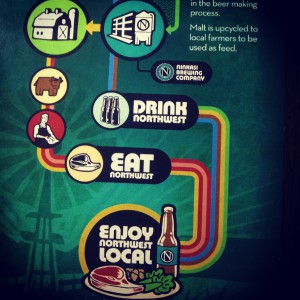“Each food items in a typical U.S. meal has traveled an average of 1,500 miles….If every U.S. citizen ate just one meal a week (any meal) composed of locally and organically raised meats and produce we would reduce our country’s oil consumption by over 1.1 million barrels of oil every week.”
-Barbara Kingsolver
Foodies; a term of common use here at the farm that carries with it the weight of a global conflict. We preach nutritional salvation, a means of food security and sovereignty unparalleled by the globalization of food systems. There is a conflict however, a growing gap between the way we live and the way we eat. It’s roots are not simply buried in the onset of fast food, though these principles do discourage a much needed slow food philosophy. The rapid pace of our society has co-evolved a consumptive ideology that continues to distance itself from the dinner table. Here at the farm we call this the convenience theory. A simple trip to the neighborhood grocer yields shrimp raised in Thailand, and bananas imported from Ecuador. Convenient? Yes. Sustainable? No! To be a foodie, to think and act as a foodie, is to to reject this convenience and replace it with localism. A bit more work of course, but well worth it to ensure the efficiency of our communal food systems.
The Urban Farm community leads a movement towards locavorism by realizing the further implications of our actions as agrarian foodies. To think locally means to transcend the boundaries put in place by a faulty international food reign. To cross these lines means not only putting in effort to cultivate and produce, but doing what you can to support your neighbor even when it means spending a bit more. Here at the Farm, we engage in experiential learning that further develops our knowledge of locavorism. Participants at the farm are introduced to local organizations such as the Willamette Valley Farm and Food Coalition, Food for Lane County, and the Eugene Farm to School program. Through these volunteer organizations, students are granted the opportunity to further their knowledge of local food production on a communal scale. Only after we are immersed in a community that thrives on local infrastructure can we begin to realize the implications of our actions. Through the adoption of a bioregionalist perspective, Farm participants grasp the potential of a locally sourced food system; understanding the economic, social, and communal benefits offered by a simple change in our consumer behavior. We challenge each other to sit and reflect before a meal, begging the question—where did our food come from? As the answers become increasingly closer to the place we call home, there is a glimmer of light in the battle for our food’s security. The Urban Farm encourages behavior such that we may be conscious of sacrificing this security for the sake of convenience. In so far that we remain progressive in our food culture, there is hope, that a new generation of locavores will further this movement and continue to develop local efficiency efforts in our community.


Leave a Reply